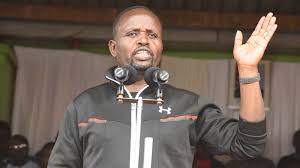Trans Nzoia Governor George Natembeya has reignited political debate in Western Kenya after accusing Prime Cabinet Secretary Musalia Mudavadi and National Assembly Speaker Moses Wetang’ula of depending on President William Ruto for political survival.
Speaking during a church service on Sunday, Natembeya argued that the two leaders’ influence was tied to the positions they currently hold in government, courtesy of Ruto’s appointments. He warned that such reliance was risky, noting that their political clout could quickly fade if the President withdrew his support.
“Wetang’ula is employed by Ruto; he has a payslip. Mudavadi is employed by Ruto; he has a payslip. If Ruto decides to sack them today, they will go home, and no one will shed a tear,” Natembeya declared.
The governor contrasted their situation with that of ODM leader Raila Odinga, who, despite lacking an official government role, continues to command loyalty and influence. He observed that Raila’s enduring support base has ensured his region enjoys significant development projects, highlighting the power of political capital independent of formal appointments.
“Raila is not in government, yet he is with the government. He has no payslip, but look at how many development projects are going to his region because of the votes he commands,” Natembeya remarked. “Why shouldn’t we also organise ourselves in the same way for the benefit of our people?”
Natembeya’s sharp remarks come amid widening cracks within his own party, the Democratic Action Party–Kenya (DAP–K). He has recently been at odds with party leader Eugene Wamalwa, accusing external forces of frustrating his push for reforms. He specifically singled out Wetang’ula’s Ford Kenya Party, alleging it was orchestrating internal wrangles to block his ascent within DAP–K.
His allies echoed the claims, suggesting a scheme to weaken his influence and deny him greater leadership roles. Earlier this month, DAP–K Secretary General Eseli Simiyu confirmed the disputes had been referred to the party’s Internal Disputes Resolution Committee, though the public spats continue to deepen divisions.
Natembeya’s comments underscore not only the fragile unity in Western Kenya politics but also the broader struggle for control and influence in a region long courted by national power brokers.

